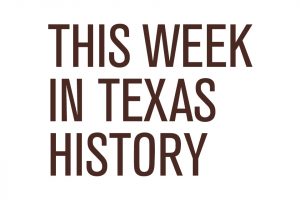By Bartee Haile
On the afternoon of May 7, 1946, Dick Kleberg drove out to where several vaqueros were branding calves on the King Ranch, and everyone stopped what he was doing to listen to the Kentucky Derby on the car radio.
Eight years earlier, Bob and Dick Kleberg, Capt. Richard King’s grandsons, bought Bold Venture as the stud for the ranch’s new thoroughbred racing stable. Five years later, the Kentucky Derby and Preakness winner sired Assault.
The frisky foal returned from a day of horseplay in the pasture with a bad limp. He had stepped on a surveyor’s stake and split his hoof. Lolo Trevino shaved and cleaned the fractured hoof, and Dr. J.K. Northway, the ranch veterinarian, put ointment and a bandage on the wound.
A more cost-conscious owner probably would have had Assault destroyed, but not Bob Kleberg, who had a soft spot for the big red chestnut. The blacksmith carefully rebuilt the hoof, and the resourceful vet invented a special shoe with a cushioned innersole. Wiseacres around the ranch nicknamed the colt “The Clubfooted Comet.”
Assault did not make a good first impression on trainer Max Hirsch. “I didn’t think he’d train at all. When he walked and trotted, you’d think he was going to fall down. It (the injured hoof) wasn’t hurting him any more, but he had gotten in the habit of favoring it and protecting it with an awkward gait.”
As a two-year-old, Assault did little to elevate his trainer’s low opinion. He made his maiden start at Belmont Park on Jun. 4, 1945 and came in twelfth. He entered nine races winning two and finishing out of the money in six. His second victory happened on the same day the United States dropped the bomb on Hiroshima, and the 70-to-1 shot paid $443.20 for a two-dollar wager.
The underachiever got off to a better than expected start in his make-it-or-break-it three-year-old season. He won a six-furlong handicap at Jamaica by four-and-a half lengths on Apr. 9, 1946 and took top money in the coveted Wood Memorial 11 days later. But a poor showing on a muddy track in the Derby trial inflated his odds to 8 to 1 in the biggest race of them all – the Kentucky Derby.
Assault broke cleanly from the starting gate at Churchill Downs, and Jockey Warren Mehrtens steered him through traffic and into fifth place as they rounded the first turn. On the backstretch horse and rider moved up two spots and into perfect position for the sprint home.
Mehrtens went to the whip at the quarter pole, and Assault answered with a blazing burst of speed that shot him into the lead. The four-footed Texan left the other 16 horses in the dust and won going away by an amazing eight lengths.
Assault was cast in the unfamiliar role of favorite for the second leg of the Triple Crown. Hot on his hooves, at least in the betting, was Lord Boswell, who had finished a disappointing fourth in the Derby.
Assault looked lethargic for the first half mile at Pimlico and hung back in the middle of the pack. Speculating jockey Mehrtens “may have been a bit scared,” a racetrack reporter wrote, “When he asked Assault for his run a little earlier than in the Derby, the colt came with a burst which carried him four lengths out from the field at the furlong pole (eighth of a mile from the finish line) but then he had nothing left.”
Lord Boswell closed the gap with every stride as he pounded down the home stretch. But Assault fought off fatigue and held on to win the Preakness by a neck.
The son had come as far as his famous father, who also triumphed at the Kentucky Derby and the Preakness in 1936. Would Assault wilt as Bold Venture had in the longer Belmont Stakes and miss his chance at immortality?
The center of attention stumbled out of the gate and brought up the rear of the seven-horse field. Merhtens did not panic like he had in the Preakness and rode a calmer, smarter race.
The pacesetter was not Lord Boswell but Hampden, a third-place performer at Churchill Downs and Pimlico. However, Natchez surged ahead at the last turn and took a two-length advantage.
Assault glided effortlessly along in the third position five lengths behind the leader. Merhtens gave him the go-ahead with 220 yards to go, and he passed the front-runner like he was standing still. He hit the wire with three lengths to spare.
The seventh winner of the Triple Crown was the first bred outside Kentucky, the horse-racing capital of the country. Assault rewarded the patient Kleberg brothers with $268,420 — the combined purses of the Derby, Preakness and Belmont — and finished 1946 with record earnings of $424,195.
Assault raced until 1950, but other than a hot streak in 1947 a series of injuries kept him from regaining his once invincible form. He lived in retirement on the King Ranch until 1971, when a broken leg forced Doc Northway to put the old champion to sleep.
“Texas Depression-Era Desperadoes,” Bartee’s new book, plus ten different collections of his columns are available at the “General Store” on his web site barteehaile.com.






